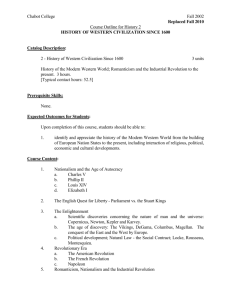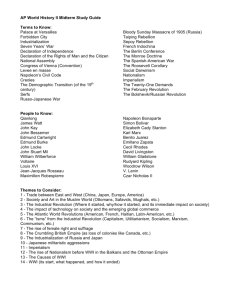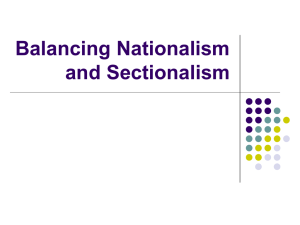4. The Political/Governmental Dimension of the Information Revolution Moderator: David Gompert
advertisement
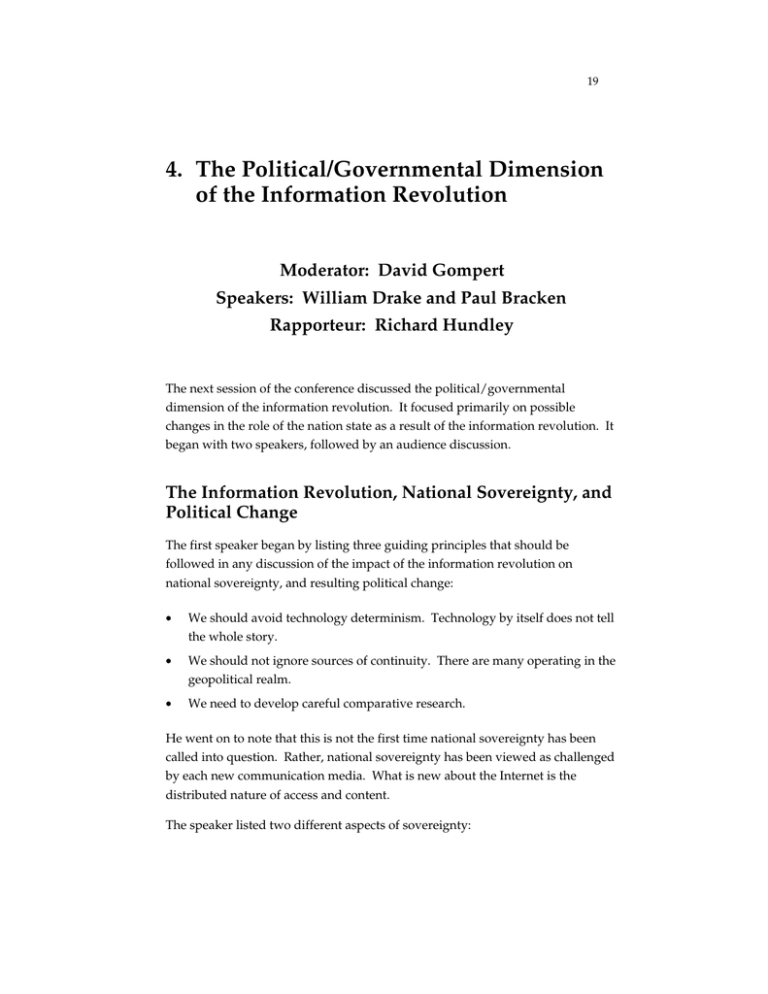
19 4. The Political/Governmental Dimension of the Information Revolution Moderator: David Gompert Speakers: William Drake and Paul Bracken Rapporteur: Richard Hundley The next session of the conference discussed the political/governmental dimension of the information revolution. It focused primarily on possible changes in the role of the nation state as a result of the information revolution. It began with two speakers, followed by an audience discussion. The Information Revolution, National Sovereignty, and Political Change The first speaker began by listing three guiding principles that should be followed in any discussion of the impact of the information revolution on national sovereignty, and resulting political change: • We should avoid technology determinism. Technology by itself does not tell the whole story. • We should not ignore sources of continuity. There are many operating in the geopolitical realm. • We need to develop careful comparative research. He went on to note that this is not the first time national sovereignty has been called into question. Rather, national sovereignty has been viewed as challenged by each new communication media. What is new about the Internet is the distributed nature of access and content. The speaker listed two different aspects of sovereignty: 20 • Constitutional sovereignty: the legal authority and primacy of national governments within their territorial domains.5 • Operational sovereignty: the ability of governments to exercise effective control within their territorial domains. Constitutional sovereignty is not being challenged by the information revolution. But operational sovereignty is, both technically and with regard to cost. The speaker noted that the current political science literature addressing the impact of the information revolution on international and national politics is posed mainly in black-and-white terms: either the nation state is on the way out, or the nation state is as powerful as ever. He feels that the situation is not eitheror, but rather somewhere in between, and varies from state to state. At the conclusion of this talk, an associate of the speaker noted that various writers have suggested that the Internet is a force for democratization (i.e., for political change in authoritarian societies). Whether or not this is true in any given country depends, in his view, on four “Internet and democratization variables”: • Regulation strategy • Openness of the political system • A state’s vulnerability to international pressure • The level of economic liberalization in a regime. The Role of Nationalism in the Information Revolution According to the second speaker, a current widely held view is that nationalism -- which he defines as a shared identity and feelings of attachment among the citizens of a nation -- should decline in importance because of globalization. He does not agree with this view. Rather, he believes that nationalism is on the rise in many parts of the world, particularly in Asia. He acknowledges that nationalism may be a somewhat declining force in North America and Western Europe, but believes it to be a rising force in many Asian nations (e.g., India, China, etc.) ______________ 5 The speaker also referred to this as “Westphalian sovereignty,” in reference to the Treaty of Westphalia in 1648, at the conclusion of the Thirty Years’ War, which established the principle that nation states do not interfere in the internal affairs of other nation states. 21 According to the speaker, nationalism has a bad reputation in political science today. It often gets equated with labels like “xenophobic,” “extreme,”, etc. This may be because governments often have manipulated nationalist feelings to obtain results that they could not otherwise achieve. But nationalism can be put to positive, progressive uses as well. For example, the Asian nations tapped forces of nationalism during the 1920s – 1950s to through out their colonial rulers and achieve independence. Today, according to the speaker, the only way for a nation like Russia to modernize is to harness nationalism. Russian, and other, leaders can use nationalism as a counter to the centrifugal forces of globalization, which threaten to break up many nations. The speaker noted that we are at a time of rapid economic change in the world. This implies higher levels of “creative destruction” and resulting disruption. In many cases these lead to a decline in real security (e.g., as obtained from job, religion, community), especially among the lower and middle classes. Nationalism will often serve to counter this. The speaker also noted that just as we need to study nationalism to understand world history over the last 150 years, he believes that nationalism will be equally relevant in the future. For all of the above reasons, the speaker believes that the U.S. should not become, or be seen as, the “enemy of nationalism.” The Discussion The moderator began the discussion portion of this session by noting that in considering the political/governmental impacts of the information revolution, we should be careful to look at “more or less,” not just “yes or no.” (In other words, things are not just black and white, but have many varying shades of gray.) Secondly, we should be careful about assigning causality, since there are other major causes operating today, not just cheaper and better information technology. Thirdly, we need to consider direct versus indirect effects. Several participants responded to the nationalism theme raised by the second speaker. One noted that nationalism serves as an important filter through which many people interpret the information they receive via the Internet and other media; for example, CNN and the New York Times are not seen as “neutral” by many non-U.S. viewers/readers. Another participant stated that some nations (such as India) are linking technology to nationalism, to further the course of the information revolution in their country. Still another participant suggested we 22 consider how nationalism will play out in the information age between information revolution “haves” -- e.g., between the U.S. and Canada, or between England and Scotland. Another participant posed the question: in the world at large (i.e., outside of the U.S.), to what extent is IT and the information revolution seen as another U.S. “threat” (i.e., of increasing U.S. hegemony)? This seemed to strike a positive chord with several participants: • One non-U.S. participant stated that the Internet is seen as an expression of U.S. nationalism by most of the rest of the world, regardless of whether it’s being used deliberately as such by the U.S. • Another non-U.S. participant noted that in 1997 there was US Congressional testimony stating that more than 70% of the value of information products worldwide was of US origin. Also, the same participant noted, the possibility that US law on commerce (especially in cyberspace) will dominate against other legal norms is being debated in Congress. • In response, a U.S. participant noted that many in the U.S. would view the U.S. approach to IT, the Internet, and the information revolution not as a manifestation of nationalism, but rather of internationalism -- specifically, an extension of the belief that our ideas, especially involving democracy, are perhaps the only basis for legitimacy. He went on to suggest that those in the U.S. having this view are very narrow-minded. • A second U.S. participant agreed with the characterization of this view (i.e., that the U.S. is internationalist rather than nationalist in its approach to the Internet and the information revolution) as narrow-minded. He stated his belief that U.S. nationalism is very strong, saying that we mask it as “human rights,” democracy,” etc., but have a strong affinity for the U.S. “model” or “role.” Another participant noted that, historically, nationalism has been based on geographical communities. The Internet makes possible non-geographic, network communities. These network communities can be either global (i.e., larger than nations) or local (i.e., smaller than nations). As the information revolution progresses, these network communities may come to suppliant, at least partially, communities based on nationalism. Changing the subject (somewhat), still another participant posed the question: who will be the “Jimmy Hoffa” of the information age? That is, what if someone organizes the system administrators of the world? If so, will he control the information revolution? 23 Another participant noted that the empowerment of individuals (e.g., Osama bin Laden) through the use of information technology is a new political factor brought into being by the information revolution. Several other participants endorsed this comment, emphasizing the importance of this factor. The moderator ended the discussion by noting that we should not forget the contribution of information technology to “hard power.”


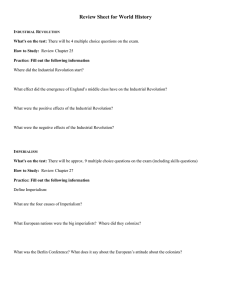

![“The Progress of invention is really a threat [to monarchy]. Whenever](http://s2.studylib.net/store/data/005328855_1-dcf2226918c1b7efad661cb19485529d-300x300.png)

